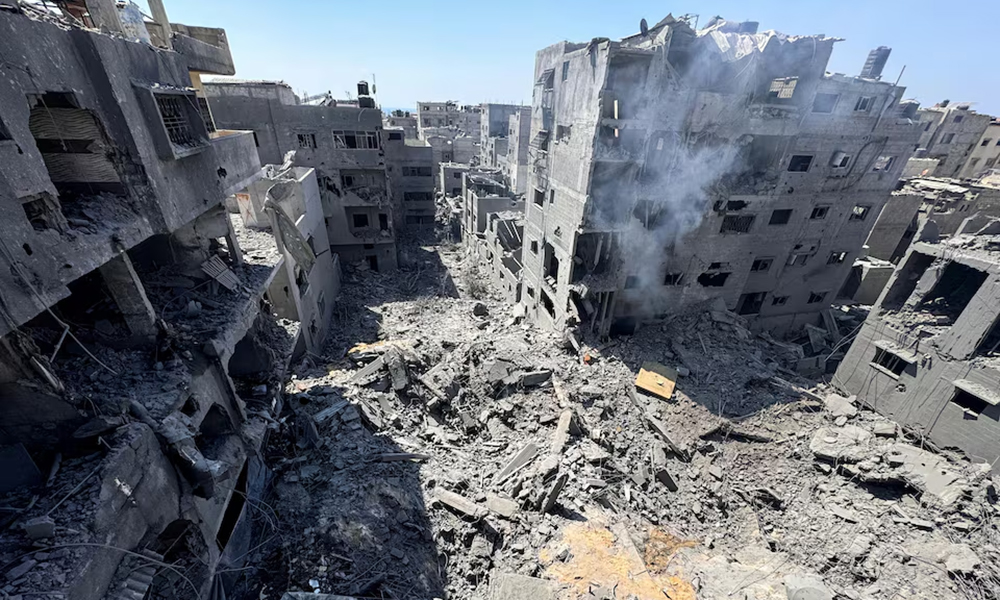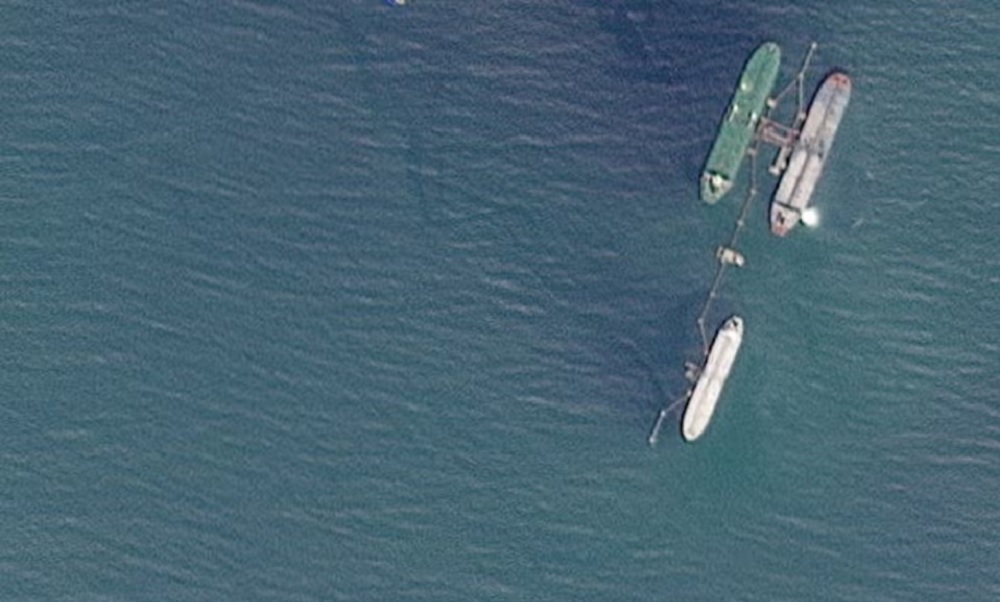World
Israeli airstrike kills eight at Gaza aid centre, witnesses say
The Israeli offensive in retaliation has killed almost 37,600 people, according to Palestinian health authorities, and has left Gaza in ruins.

Eight Palestinians were killed on Sunday in an Israeli airstrike on a training college near Gaza City being used to distribute aid, Palestinian witnesses said, as Israeli tanks pushed further into the southern city of Rafah, Reuters reported .
The strike hit part of a vocational college run by the U.N. Palestinian refugee agency UNRWA that is now providing aid to displaced families, the witnesses said.
“Some people were coming to receive coupons and others had been displaced from their houses and they were sheltering here. Some were filling up water, others were receiving coupons, and suddenly we heard something falling. We ran away, those who were carrying water let it spill,” said Mohammed Tafesh, one of the witnesses.
A Reuters photographer saw a low-rise building completely demolished and bodies wrapped in blankets laid out beside the road, waiting to be taken away.
“We pulled out martyrs (from beneath the rubble), one who used to sell cold drinks and another who used to sell pastries and others who distributed or received coupons,” Tafesh said. “There are about four or five martyrs and 10 injured. Thank God, the condition of the injured is good.”
The Israeli military said the site, which it said had served in the past as a UNRWA headquarters, has been used by Hamas and Islamic Jihad militants. It added that precautionary measures were taken before the strike to reduce the risk of harming civilians, read the report.
“This morning (Sunday), IAF fighter jets directed by IDF and ISA intelligence struck terrorist infrastructure in which Hamas and Islamic Jihad terrorists were operating,” the military said in a statement.
“This is another example of Hamas’ systematic exploitation of civilian infrastructure and the civilian population as a human shield for its terrorist activities,” it added.
Hamas denies Israeli accusations that it uses civilians as human shields or civilian facilities for military purposes.
Juliette Touma, UNRWA’s director of communications, said the agency was looking into details of the reported attack before providing more information.
“Since the beginning of the war, we have recorded that nearly 190 of our buildings have been hit. This is the vast majority of our buildings in Gaza,” she said. A total of 193 UNRWA team members have been killed in the conflict, she added.
Just after midnight, an Israeli air strike hit a clinic in Gaza City, killing the director of ambulance and emergency services at the territory’s health ministry, Hani Al-Jaafarwi, and another medical staffer, Hamas media said. There was no immediate Israeli comment.
‘INTENSE PHASE’ ENDING
Israeli Prime Minister Benjamin Netanyahu said on Sunday that the phase of intense fighting against Hamas in the Gaza Strip would end “very soon” but that the war would not end until the Islamist group no longer controls the Palestinian enclave.
“After the intense phase is finished, we will have the possibility to move part of the forces north. And we will do this,” Netanyahu said in an interview with Israel’s Channel 14.
Israel’s fighting against Iran-backed Hezbollah has escalated on the northern border with Lebanon, where many Israeli towns have been evacuated. Netanyahu said a northern deployment would allow residents to come home.
More than eight months into Israel’s war in the Hamas-administered Palestinian enclave, its advance is focused on the two areas its forces have yet to seize – Rafah on Gaza’s southern tip and the area surrounding Deir al-Balah in the centre, Reuters reported.
Israel’s ground and air campaign in Gaza was triggered when Hamas-led militants stormed into southern Israel on Oct. 7, killing around 1,200 people and seizing more than 250 hostages, according to Israeli tallies.
The Israeli offensive in retaliation has killed almost 37,600 people, according to Palestinian health authorities, and has left Gaza in ruins.
Residents said Israeli tanks had advanced to the edge of the Mawasi displaced persons’ camp in the northwest of Rafah in fierce fighting with Hamas-led fighters, part of a push into western and northern Rafah during which they had blown up dozens of houses in recent days.
“The fighting with the resistance has been intense. The occupation forces are overlooking the Mawasi area now, which forced families there to head for Khan Younis,” said one resident, who asked not to be named, on a chat app.
The Israeli military said it was continuing “intelligence-based, targeted operations” in the Rafah area and had located weapons stores and tunnel shafts, and killed Palestinian gunmen.
The armed wings of Hamas and the Islamic Jihad movement said their fighters had attacked Israeli forces in Rafah with anti-tank rockets and mortar bombs and pre-planted explosive devices.
In Beit Lahiya in the northern Gaza Strip, health officials at Kamal Adwan Hospital said two babies had died of malnutrition. That took the number of children who have died of malnutrition or dehydration since Oct. 7 to at least 31, which health officials say is likely an undercount.
Related Stories:
Gaza conflict has caused major environmental damage, UN says
Afghan, Iranian acting FMs discuss bilateral cooperation, Gaza war
World
Venezuela-US tensions spike in wake of seized tanker as Nobel winner vows change

Venezuelan opposition leader Maria Corina Machado on Friday promised political change after slipping out of the country in secret to collect the Nobel Peace Prize, as the shock waves intensified from the Trump administration’s seizure of an oil tanker earlier this week.
That escalation came on the heels of a large-scale U.S. military buildup in the southern Caribbean as President Donald Trump campaigns to oust Venezuelan leader Nicolas Maduro, pushing relations to their most volatile point in years, Reuters reported.
The effects could ripple through the region, with Venezuelan oil exports falling sharply and crisis-stricken Cuba, already straining to power its grid, at risk of losing supply.
The U.S. seizure of the Skipper tanker off Venezuela’s coast on Wednesday marked the first U.S. capture of Venezuelan oil cargo since sanctions were imposed in 2019.
The vessel is now heading to Houston, where it will offload its cargo onto smaller ships, Reuters reported.
The Trump administration does not recognize Maduro, in power since 2013, as Venezuela’s legitimate leader.
Washington has signalled more seizures are planned as part of efforts to choke off sanctioned oil flows, and subsequently imposed new sanctions on three nephews of Maduro’s wife and six tankers linked to them.
The U.S. military presence in the Caribbean has grown as Trump in recent weeks has discussed potential military intervention in Venezuela, based on accusations that the country ships narcotics to the United States. The Venezuelan government has denied the accusations.
So far there have been over 20 U.S. military strikes in the Caribbean and Pacific against suspected drug vessels this year, in which nearly 90 people have been killed, alarming human rights advocates and stirring debate among U.S. lawmakers.
While many Republicans have backed the campaign, Democrats have questioned whether the campaign is illegal and urged more transparency, including the release of a full, unedited video, opens new tab of strikes on a suspected drug-trafficking boat.
MACHADO DEFIES BAN, URGES TRANSITION
Machado defied a decade-long travel ban and a period in hiding to travel to Oslo on Thursday, noting that she would soon bring the Nobel Peace Prize back home to Venezuela.
She said Maduro would leave power “whether there is a negotiated changeover or not,” vowed she is focused on a peaceful transition, and thanked Trump for his “decisive support.”
Machado is aligned with U.S. hardliners who accuse Maduro of ties to criminal networks – claims that U.S. intelligence has reportedly questioned.
When asked at a press conference in Oslo if she believed U.S. intervention was needed in Venezuela, Machado replied, “We are asking the world to help us.”
Venezuela condemned the tanker seizure as “blatant theft” and “international piracy,” saying it would file complaints with international bodies.
At the same time, Venezuelan lawmakers took a step to withdraw the country from the International Criminal Court, which is currently investigating alleged human rights abuses in the South American country.
Adding to the friction, the Venezuelan government announced the suspension of a U.S. migrant repatriation flight on Friday. A U.S. official countered that deportation flights would continue.
World
Putin arrives in Ashgabat to hold series of meetings

Russian President Vladimir Putin has arrived in Turkmenistan’s capital for a two-day visit.
According to TASS, the presidential aircraft of the Rossiya Special Flight Detachment landed near the presidential terminal of Ashgabat International Airport, commonly referred to as the “small bird” for its distinctive design.
During his visit, Putin will attend an international forum titled “Peace and Trust: Unity of Goals for a Sustainable Future” and hold several bilateral meetings.
The Kremlin has confirmed talks with Turkish President Recep Tayyip Erdogan, while the Iranian Embassy has announced that a meeting with President Masoud Pezeshkian is also planned.
The Ashgabat forum will also be attended by Turkmen President Serdar Berdymukhamedov, along with the presidents of Armenia, Iraq, Kazakhstan, Kyrgyzstan, Uzbekistan and Tajikistan, as well as the prime ministers of Azerbaijan, Hungary, Georgia and Pakistan.
World
Trump launches gold card program for expedited visas with a $1 million price tag

President Donald Trump’s administration officially launched his “Trump Gold Card” visa program on Wednesday to provide a pathway, with a steep price, for non-U.S. citizens to get expedited permission to live in the United States.
The website Trumpcard.gov, complete with an “apply now” button, allows interested applicants to pay a $15,000 fee to the Department of Homeland Security for speedy processing, Reuters reported.
After going through a background check or vetting process, applicants must then make a “contribution” — the website also calls it a “gift” — of $1 million to get the visa, similar to a “Green Card,” which allows them to live and work in the United States.
“Basically it’s a Green Card, but much better. Much more powerful, a much stronger path,” Trump told reporters at the White House. “A path is a big deal. Have to be great people.”
Commerce Secretary Howard Lutnick said some 10,000 people have already signed up for the gold card during a pre-registration period and he expected many more to do so. “I would expect over time that we’d sell, you know, thousands of these cards and raise, you know, billions, billions of dollars,” Lutnick told Reuters in a brief interview.
Lutnick said the gold card program would bring people into the United States who would benefit the economy. He compared that to “average” Green Card holders, whom he said earned less money than average Americans and were more likely to be on or have family members on public assistance. He did not provide evidence for that assertion.
Trump’s administration has pursued a broad crackdown on immigration, deporting hundreds of thousands of people who were in the country illegally and also taking measures to discourage legal immigration.
The gold card program is the Trump version of a counter balance to that, designed to make money for the U.S. Treasury in the same way the president, a former New York businessman and reality television host, has said his tariff program has successfully done.
Lutnick noted that there was also a corporate version of the gold card that allowed companies to get expedited visas for employees they wanted to work in the United States, for a $2 million contribution per employee.
-

 Latest News2 days ago
Latest News2 days agoMuttaqi: Afghanistan’s progress requires both religious and modern education
-

 Sport4 days ago
Sport4 days agoILT20: Desert Vipers edge Gulf Giants in historic super over thriller
-

 Regional4 days ago
Regional4 days agoSix Pakistani soldiers killed in TTP attack in Kurram District
-

 Business4 days ago
Business4 days agoTrade bodies warn almost 11,000 Afghan transit containers stuck at Karachi port
-

 World4 days ago
World4 days agoPowerful 7.6 earthquake hits northern Japan, tsunami warnings issued
-

 Latest News3 days ago
Latest News3 days agoTrump calls Afghanistan a ‘hellhole’ country as US expands immigration restrictions
-

 Sport5 days ago
Sport5 days agoSorkh Poshan Khafi defeats Sarsabz Yashlar 4-0 in Afghanistan Champions League
-

 Sport3 days ago
Sport3 days agoCommanding wins for Arman FC and Sarsabz Yashlar in Afghanistan Champions League


























